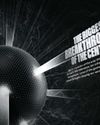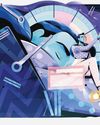
The last few years have seen a lot of discussion about a ‘replication crisis’ or ‘credibility crisis’ in psychology. Various scientific findings, it seems, don’t appear to be repeatable when other scientists run exactly the same experiments. Most of the focus in this crisis is on how scientists behave: were the original experiments biased? Was the work sloppy? Was someone gaming the system or even cheating? But perhaps a more pernicious problem is deeply rooted in how people think.
Many people who practise, use and report on the science of psychology assume that thoughts, feelings, behaviours and other psychological outcomes are the result of one or two strong factors or causes. This is called a ‘mechanistic mindset’. Typical experiments attempt to isolate one or two variables, manipulate them and observe moderate to strong effects that are easy to replicate. For example, if we cause people to feel angry by showing them a film clip that violates their deeply held values, a mechanistic mindset says that they should scowl, their blood pressure should rise and they should be more likely to act aggressively.
Esta historia es de la edición Summer 2021 de BBC Focus - Science & Technology.
Comience su prueba gratuita de Magzter GOLD de 7 días para acceder a miles de historias premium seleccionadas y a más de 9,000 revistas y periódicos.
Ya eres suscriptor ? Conectar
Esta historia es de la edición Summer 2021 de BBC Focus - Science & Technology.
Comience su prueba gratuita de Magzter GOLD de 7 días para acceder a miles de historias premium seleccionadas y a más de 9,000 revistas y periódicos.
Ya eres suscriptor? Conectar

THE WORST IDEAS OF THE 21ST CENTURY
NOT ALL IDEAS CAN BE HITS. ALONGSIDE GROUND-BREAKING INNOVATIONS, 21ST-CENTURY SCIENTISTS HAVE HELMED THEIR SHARE OF WILD TECH FLOPS, DUBIOUS THEORIES AND OVERHYPED BREAKTHROUGHS. HERE ARE THE BIGGEST TO FORGET

10 IDEAS THAT WILL SHAPE YOUR NEXT 25 YEARS
Predicting the future is considered a fool's game. But it's one many of us like to play.

THE BIGGEST BREAKTHROUGHS OF THE CENTURY
We're a quarter of the way into the new century. To mark this milestone, we asked the UK's top minds to highlight some of the game-changing scientific breakthroughs shaping our world since the year 2000

DO THE SCIENCE COGNITIVE SHUFFLE
Trouble sleeping? A lot on your mind? Use this trick and sedate your synapses

WHAT DETERMINES HOW MANY ABS I CAN GET?
Assuming you're a human being, you have exactly the same number of abs as everybody else: two.

HOW CAN I IDENTIFY MY PSYCHOLOGICAL BLIND SPOT?
In the 1950s two American psychologists, Joseph Luft and Harrington Ingham, proposed a way of thinking about psychological blind spots - things you don't know about yourself - that they called the 'Johari Window' (the term is a combination of their first names).

How can I change my personality?
Want to become more confident, extroverted or assertive? Science shows that with a few simple changes, you can unlock your best self

Could your cosmetics be harming your health?
Cosmetic companies are phasing out microplastics and so-called 'forever chemicals' to help protect consumers.

extraterrestrial US Congress is talking about activity again. Is the truth really out there?
Despite several testimonies, the question remains frustratingly unanswered

Map of 100 million human body cells revealed
Over three dozen new studies mark significant milestone towards complete Human Cell Atlas